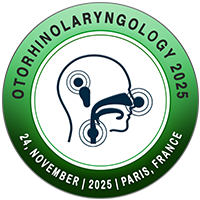
Qiong Wu
Xinhua Hospital, Shanghai Jiaotong University School of Medicine, ChinaPresentation Title:
Copper chelator ammonium tetrathiomolybdate activates Nrf2/GPX4 signaling pathway to alleviate gentamicin-induced vestibular
Abstract
Background: Gentamicin (GM)-induced vestibular dysfunction is a
prevalent clinical issue in otology, with its mechanisms yet to be fully
understood. We found that this process may be related to ferroptosis of
vestibular hair cells. Although GPX4 (glutathione peroxidase 4) plays a master
role in blocking ferroptosis by eliminating phospholipid hydroperoxides, the
regulation of GPX4 remains poorly understood. Here, we report a novel NRF2
activator ammonium Tetrathiomolybdate (TM) and intratympanic injection of TM
alleviates vestibular dysfunction in the model mice.
Methods: The study constructed a mouse model of GM induced
vestibular dysfunction and validated its potential for repairing GM induced
vestibular dysfunction through TM intervention. To investigate the effect and
mechanism of TM regulation on Nrf2/GPX4 signaling axis in improving vestibular
dysfunction from three aspects: morphology, function, and molecular mechanism.
Results: We found that during GM-induced death in vestibular hair
cells, GPX4 had a high fold change in the hair cells of the utricle. The
process closely linked to the activation of ferroptosis signaling axis as indicated by transcriptomic analysis.
Surprisingly, we found that the intervention of TM my reverse this
process. TM therapy can significantly alleviate vestibular dysfunction caused
by gentamicin. Additionally, we showed that TM treatment promoted NRF2 nuclear
translocation and upregulated transcription level of NRF2 target genes,
especially GPX4, in vestibular hair cells. Moreover, NRF2 deficiency directly
hindered TM-mediated antioxidative and anti-ferroptosis effects.
Conclusion: TM is a novel NRF2 activator and TM can ameliorate
GM-induced vestibular dysfunction through regulation of Nrf2/GPX4 signaling
axis, offering new therapeutic insights and targets for the clinical management
of related conditions.
Biography
Qiong Wu graduated from
Nantong University School of Medicine and is currently pursuing a doctoral
degree at Shanghai Jiao Tong University. She has published over 10 SCI papers
and has been cited multiple times. She has been serving as a reviewer for
several well-known

